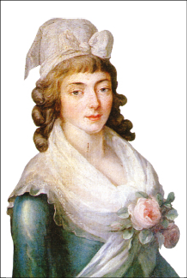17. Jeanne-Marie Roland (1754-1793), Personal Memoirs, 179530

Jeanne-Marie Roland was a leading figure of the Girondist faction, a group which was very influential in the early stages of the Revolution but ultimately attracted the suspicion of Robespierre and his Jacobins.31 Along with many other Girondists, she was condemned to death, and it is said that her last words, on seeing the statue of a goddess beside the guillotine, were: ‘Oh Freedom, how many crimes are committed in your name!’ She wrote the Mémoires from which this extract comes when she was imprisoned in the Conciergerie, awaiting trial.
Philosophy has dispelled the delusions of baseless faith, but it has not reduced the effect certain objects have on my senses, nor has it undermined their impact on the thoughts or moods which such things used once to inspire in me. I can still feel involved in the celebration of Holy Communion if the service is conducted with solemnity; I forget all the falsity of the priests, the ridiculous nature of the tales they tell, or the absurdity of their (so-called) mysteries; all I see is the coming together of frail humans, imploring the help of a Supreme Being; the sufferings of humanity, the consoling hope of a powerful Judge occupy my thoughts; outlandish images fade away, passions are stilled, I have a keener desire to do my duty; if music plays a part in these ceremonies, I find myself transported to another world, and I am a better person when I leave the place to which an ignorant populace has come without thinking, just to pay tribute to a piece of bread. What is true of so many other human institutions is true also of religion; it does not change the mind of an individual, it accommodates itself to one’s nature, and is elevated or diminished with it. The common man thinks little, takes people at their word, and acts out of instinct, with the result that there is a permanent contradiction within him between the teaching he has received and the way he behaves. Those of strong moral fibre conduct themselves quite differently; their need is harmony, their behaviour is the perfect realisation of their beliefs. As a child, I had to absorb the beliefs I was given; they remained mine until I was sufficiently enlightened to be able to question them; but even at that point, all my actions flowed from them. I was astonished by the casual attitude of those who, while professing similar beliefs to mine, behaved quite differently, just as it angers me now to see the cowardice of men who wish to have a homeland and yet still attach importance to their personal life at a time when they should be putting it on the line in the service of their country.
Read the free original text online (facsimile), 1847 edition: https://books.google.com.ec/books?id=EL0NAAAAIAAJ&printsec=frontcover
30 Jeanne-Marie Roland, Mémoires particuliers, in Catriona Seth, La Fabrique de l’intime, Paris: Robert Laffont, 2013, p. 533.
31 Portrait of Jeanne-Marie Roland de la Platière by unknown artist: https://commons.wikimedia.org/wiki/File:Madame_Roland.png







